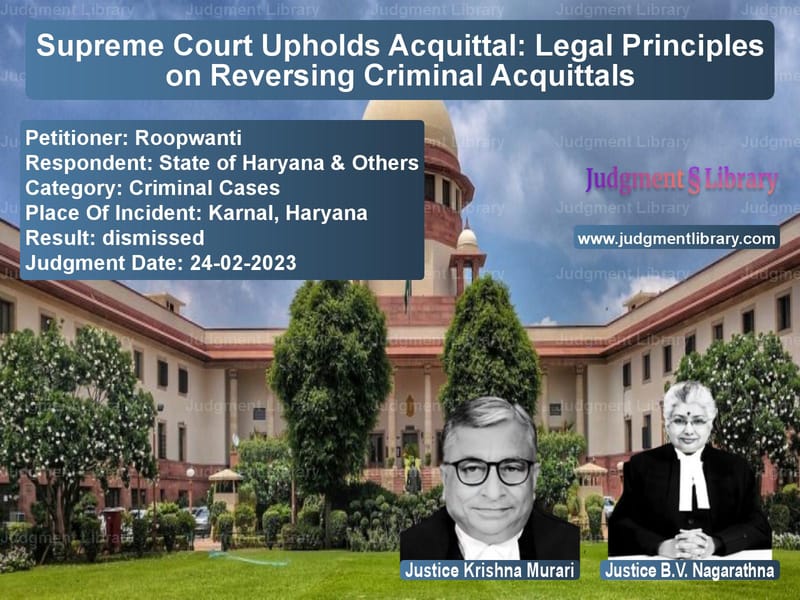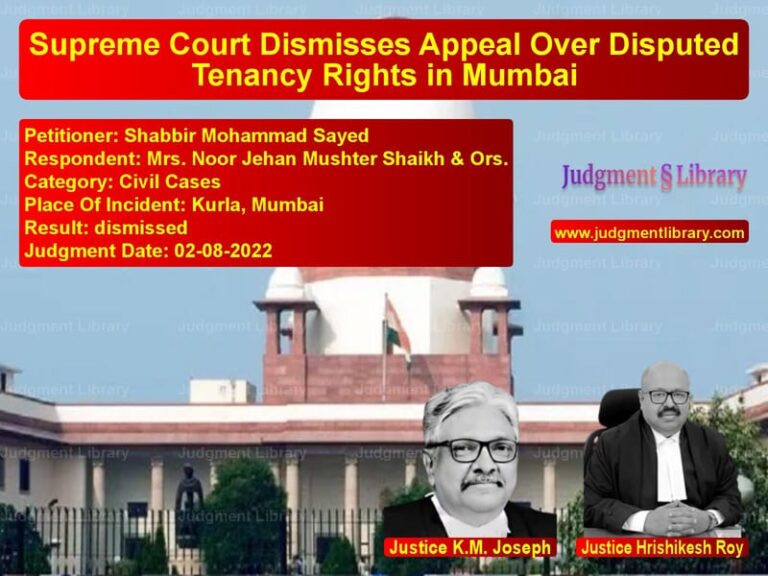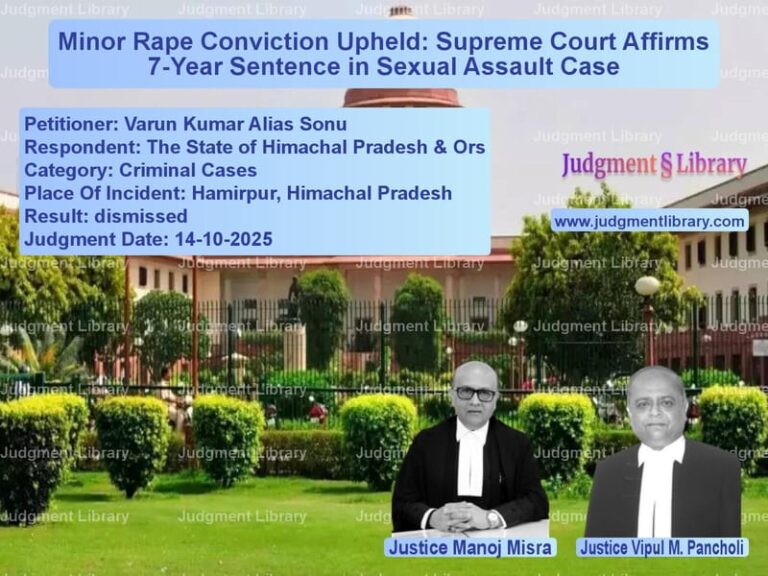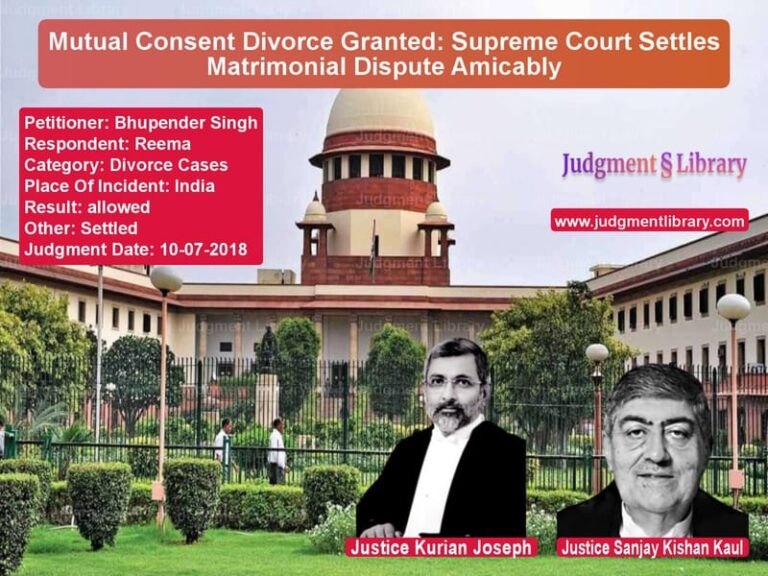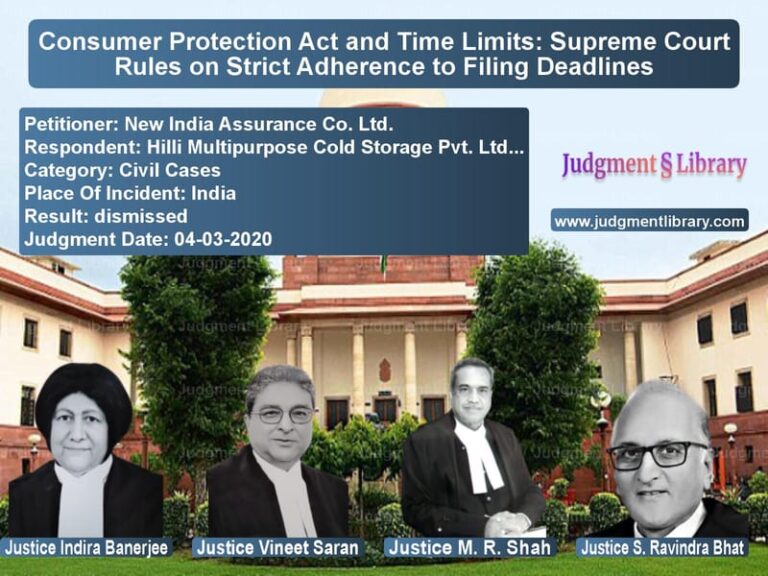Supreme Court Upholds Acquittal: Legal Principles on Reversing Criminal Acquittals
The case of Roopwanti vs. State of Haryana & Others is a significant legal battle involving a criminal appeal challenging the acquittal of multiple accused in a murder case. The Supreme Court, in its judgment dated February 24, 2023, upheld the acquittal, reinforcing key legal principles regarding the reversal of acquittals in criminal law.
The case originated from an incident on December 22, 2009, in which the deceased was allegedly attacked by the accused, leading to his hospitalization and subsequent death on December 23, 2009. The police registered an FIR (No. 905) against the accused under Sections 148, 149, 323, 324, 307, 302, and 506 of the Indian Penal Code (IPC). Following the investigation, the case was committed to trial, and the accused were charge-sheeted. However, the trial court acquitted them, citing doubts over the prosecution’s case. The Punjab & Haryana High Court upheld the acquittal on January 24, 2013. Dissatisfied with the decision, the appellant, mother of the deceased, approached the Supreme Court.
Background of the Case
The case primarily revolved around the prosecution’s ability to prove the charges beyond a reasonable doubt. The trial court noted inconsistencies in witness statements and the absence of conclusive forensic evidence linking the accused to the crime. The appellant argued that the High Court failed to reappreciate the evidence and overlooked crucial aspects that pointed to the accused’s guilt. However, the Supreme Court reiterated the established legal principle that an acquittal reinforces the presumption of innocence and should not be reversed unless there are compelling reasons.
Trial Court’s Findings
The trial court, in its detailed judgment dated October 18, 2011, pointed out key reasons for acquitting the accused:
- Eyewitness Testimonies Were Inconsistent: The statements of the eyewitnesses, including the appellant (mother of the deceased), differed significantly. The appellant gave a different account from that of PW1, casting doubt on the prosecution’s version of events.
- Presence of the Appellant at the Crime Scene Not Proved: The court observed that there was no independent corroboration of the appellant’s claim that she was present at the scene of the crime.
- Forensic Evidence Did Not Establish Guilt: The forensic report showed no blood on most of the recovered weapons except for traces on one lathi, which could not be conclusively linked to the deceased.
- Benefit of Doubt: Since criminal cases require proof beyond a reasonable doubt, any inconsistencies or gaps in the prosecution’s case must be resolved in favor of the accused.
Arguments by the Appellant
The appellant challenged the acquittal on several grounds:
- The trial court had erred in acquitting the accused despite substantial evidence.
- The minor contradictions in witness testimonies should not have led to the rejection of the prosecution’s case.
- The High Court failed to reanalyze the evidence and correct the trial court’s error.
- The forensic evidence, though not conclusive, supported the prosecution’s version and should have been given more weight.
Arguments by the Respondents
The respondents defended the acquittal with the following arguments:
- The prosecution’s case was weak and filled with contradictions.
- The forensic evidence did not directly implicate any of the accused.
- The trial court had already examined all aspects thoroughly, and there was no legal basis for reversing the acquittal.
Supreme Court’s Observations and Judgment
The Supreme Court upheld the acquittal, emphasizing key legal principles regarding the reversal of acquittals. The Court stated:
“The presumption of innocence in favor of the accused, once strengthened by acquittal, should not be reversed lightly unless compelling reasons exist.”
The judgment cited several precedents, including:
- Allarakha K. Mansuri vs. State of Gujarat: If two views are possible, the one favoring the accused must be adopted.
- Suman Chandra vs. Central Bureau of Investigation: Reversal of acquittal is permissible only if the trial court’s view is unreasonable or perverse.
- Mrinal Das & Others vs. State of Tripura: An order of acquittal should be interfered with only when it is “clearly unreasonable” and “compelling and substantial reasons” exist.
Key Takeaways from the Judgment
- Burden of Proof on the Prosecution: The prosecution must establish the guilt of the accused beyond a reasonable doubt.
- Presumption of Innocence: Once acquitted, an accused enjoys an enhanced presumption of innocence.
- Limited Scope for Reversal: Acquittals should only be reversed if there is clear perversity or miscarriage of justice.
Implications of the Judgment
This judgment reinforces the principle that appellate courts must exercise caution in overturning acquittals. It highlights the necessity of strong and reliable evidence for a conviction and the importance of procedural fairness in criminal trials.
Read also: https://judgmentlibrary.com/supreme-court-ruling-on-dowry-death-case-understanding-section-319-crpc/
Conclusion
The Supreme Court’s decision in this case upholds the fundamental legal principles that protect the rights of accused persons. By reaffirming the limited scope for reversing acquittals, the ruling ensures that criminal convictions are based on solid evidence rather than speculation. This case serves as an essential precedent for future appeals seeking to overturn acquittals.
Petitioner Name: Roopwanti.Respondent Name: State of Haryana & Others.Judgment By: Justice Krishna Murari, Justice B.V. Nagarathna.Place Of Incident: Karnal, Haryana.Judgment Date: 24-02-2023.
Don’t miss out on the full details! Download the complete judgment in PDF format below and gain valuable insights instantly!
Download Judgment: roopwanti-vs-state-of-haryana-&-o-supreme-court-of-india-judgment-dated-24-02-2023.pdf
Directly Download Judgment: Directly download this Judgment
See all petitions in Murder Cases
See all petitions in Bail and Anticipatory Bail
See all petitions in Judgment by Krishna Murari
See all petitions in Judgment by B.V. Nagarathna
See all petitions in dismissed
See all petitions in supreme court of India judgments February 2023
See all petitions in 2023 judgments
See all posts in Criminal Cases Category
See all allowed petitions in Criminal Cases Category
See all Dismissed petitions in Criminal Cases Category
See all partially allowed petitions in Criminal Cases Category

